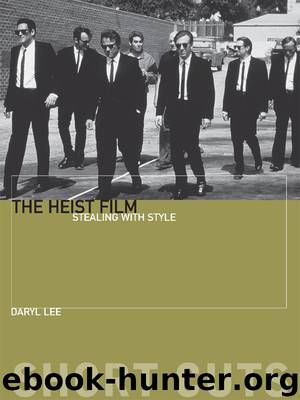The Heist Film by Daryl Lee

Author:Daryl Lee
Language: eng
Format: epub
Tags: PER004030, Performing Arts/Film & Video/History & Criticism, PER004020, Performing Arts/Film & Video/Guides & Reviews
Publisher: Columbia University Press
Published: 2014-03-13T16:00:00+00:00
Pendlebury to his female vendor: I told you never to use a crate marked ‘R’!
The woman, with a heavy French accent: But that is not an ‘ahr’, Monsieur. It is an ‘err’ [eh-rr]!
Pendlebury, discombobulated: It’s an ‘r’ [‘are’] in English!
As the irony of Pendlebury’s comment about cultural depravity now becomes clear, the two bumbling thieves take off to track down the objects for fear that, once in England, the objects could be traced back to them. The girls having taken an elevator, Holland and Pendlebury hurry down a winding service staircase. The standout two-minute sequence of their vertiginous descent is marked by rapid cross-cutting between Holland, Pendlebury and the elevator, intercut with shots from the interior of the Tower towards Paris in the background. The men circle the staircase in an overheard shot made by the camera spinning wildly on its axis, until the image itself spins out of control onto the ground. As they spin, a wide angle lens distorts their shapes and the Tower in the background, its iconic frame teetering back and forth in vertigo.
The verbal wit and formally self-conscious visuals of this sequence recall several avant-garde moments, whether Crichton intended this or not. They include 1920s New Photography (part of Robert Siodmak’s background and visual style in Criss Cross and The Killers), Dadaism and other modernist film experiments. Dada may be behind the verbal play of the sequence, since Marcel Duchamp’s infamous readymade urinal Fountain (1917), signed ‘R. Mutt’, and one of his pseudonyms, Rrose Sélavy, a pun on Eros, c’est la vie (‘Eros is life’), which featured in his short Anemic Cinema (1926), both play with the French ‘er’, the very phoneme that produces the catastrophic error in The Lavender Hill Mob. The City Symphony films, fascinated and repulsed by the rapid technological change, uncanny spaces and demographic concentration of the modern metropolis, were ‘poetic records of the camera’s ability to capture the dynamic rhythm and kaleidoscopic pattern of city life’ (Barsam 1992: 59). Another possible precursor would be René Clair’s Dadaist experiment Entr’acte (1924) or his fantastical Paris qui dort (1925). The final segments of Entr’acte involve a funeral procession that (quite literally) turns into an unhinged roller-coaster ride through the city of Paris, thanks to rapid editing and swirling camera effects. The science-fiction comedy Paris qui dort portrays a small group of people saved from a mad scientist’s device that instantaneously immobilises everyone else in the city. They walk through the streets, briefly experiencing a life of ease and hedonistic pleasure, thieving where necessary from the inhabitants frozen in time. They bring their booty to the top of the Eiffel Tower where they take in the full view of the city. This reminds us of Clair’s conversion of the Eiffel Tower into a cinematic apparatus, a ‘viewfinder’ and veritable tripod for unique tilts and crane shots: ‘The [T]ower, then, is not only a complex, infinitely stimulating set; it provides a range of low- and high-angle positions, a vocabulary of movement, a play of
Download
This site does not store any files on its server. We only index and link to content provided by other sites. Please contact the content providers to delete copyright contents if any and email us, we'll remove relevant links or contents immediately.
The Kite Runner by Khaled Hosseini(5183)
Gerald's Game by Stephen King(4656)
Dialogue by Robert McKee(4406)
The Perils of Being Moderately Famous by Soha Ali Khan(4221)
The 101 Dalmatians by Dodie Smith(3512)
Story: Substance, Structure, Style and the Principles of Screenwriting by Robert McKee(3470)
The Pixar Touch by David A. Price(3442)
Confessions of a Video Vixen by Karrine Steffans(3311)
How Music Works by David Byrne(3272)
Harry Potter 4 - Harry Potter and The Goblet of Fire by J.K.Rowling(3076)
Fantastic Beasts: The Crimes of Grindelwald by J. K. Rowling(3059)
Slugfest by Reed Tucker(3007)
The Mental Game of Writing: How to Overcome Obstacles, Stay Creative and Productive, and Free Your Mind for Success by James Scott Bell(2909)
4 - Harry Potter and the Goblet of Fire by J.K. Rowling(2704)
Screenplay: The Foundations of Screenwriting by Syd Field(2647)
The Complete H. P. Lovecraft Reader by H.P. Lovecraft(2565)
Scandals of Classic Hollywood: Sex, Deviance, and Drama from the Golden Age of American Cinema by Anne Helen Petersen(2526)
Wildflower by Drew Barrymore(2489)
Robin by Dave Itzkoff(2441)
